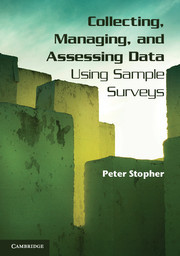Description
Collecting, Managing, and Assessing Data Using Sample Surveys
Author: Stopher Peter
A step-by-step guide to the design and implementation of surveys.
Language: English
Subject for Collecting, Managing, and Assessing Data Using Sample...:
Approximative price 56.31 €
In Print (Delivery period: 14 days).
Add to cart
Collecting, managing, and assessing data using sample surveys
Publication date: 01-2012
560 p. · 17.5x24.7 cm · Paperback
Publication date: 01-2012
560 p. · 17.5x24.7 cm · Paperback
Approximative price 111.60 €
In Print (Delivery period: 14 days).
Add to cart
Collecting, managing, and assessing data using sample surveys
Publication date: 01-2012
560 p. · 15.9x25.4 cm · Hardback
Publication date: 01-2012
560 p. · 15.9x25.4 cm · Hardback
Description
/li>Contents
/li>Biography
/li>
Collecting, Managing, and Assessing Data Using Sample Surveys provides a thorough, step-by-step guide to the design and implementation of surveys. Beginning with a primer on basic statistics, the first half of the book takes readers on a comprehensive tour through the basics of survey design. Topics covered include the ethics of surveys, the design of survey procedures, the design of the survey instrument, how to write questions and how to draw representative samples. Having shown readers how to design surveys, the second half of the book discusses a number of issues surrounding their implementation, including repetitive surveys, the economics of surveys, web-based surveys, coding and data entry, data expansion and weighting, the issue of non-response, and the documenting and archiving of survey data. The book is an excellent introduction to the use of surveys for graduate students as well as a useful reference work for scholars and professionals.
List of figures; List of tables; 1. Introduction; 2. Basic statistics and probability; 3. Basic issues in surveys; 4. Ethics of surveys of human populations; 5. Design a survey; 6. Methods for conducting surveys of human populations; 7. Focus groups; 8. Design of survey instruments; 9. Design of questions and question wording; 10. Special issues for qualitative and preference surveys; 11. Design of data collection procedures; 12. Pilot surveys and pretests; 13. Sample design and sampling; 14. Repetitive surveys; 15. Survey economics; 16. Survey implementation; 17. Web-based surveys; 18. Coding and data entry; 19. Data expansion and weighting; 20. Nonresponse; 21. Measuring data quality; 22. Future directions in survey procedures; 23. Documenting and archiving; References; Index.
Peter Stopher is Professor of Transport Planning at the Institute of Transport and Logistics Studies at the University of Sydney. He has also been a professor at Northwestern University, Cornell University, McMaster University and Louisiana State University. Professor Stopher has developed a substantial reputation in the field of data collection, particularly for the support of travel forecasting and analysis. He pioneered the development of travel and activity diaries as a data-collection mechanism, and has written extensively on issues of sample design, data expansion, nonresponse biases and measurement issues.
© 2024 LAVOISIER S.A.S.

